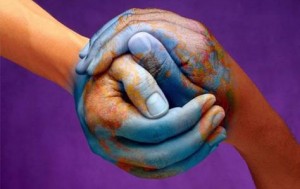What would you do if you suddenly found yourself in the middle of an armed street fight?
My colleague Jon and I just spent the past five days training peacemakers throughout the country to humbly enter into conflict equipped with compassion and curiosity rather than with weapons to destroy. We teach that the work of peacemaking is a really difficult, often dangerous, always costly, and ever rewarding way of life. We remind those we’re training that God set the practical peacemaking template in the life, death, and resurrection of Jesus in the way that He saw us, immersed into our broken story, contended for our flourishing, and decisively restored the severed relationships between us at the cost of His blood. Peacemakers are men and women who, daily, spend their lives joining God in is His work of restoration.
On Monday, we found ourselves in Dallas, Texas working with Free City International, an incredible organization strategically placed within the refugee community. Currently, the neighborhood that FCI is embedded within is home to 10,000 refugees from fifteen countries who speak 140 different languages.
After six hours of training in the practical reality of peacemaking, training shifted to practice. It had to.
As we drove from the training, the neighborhood high school was letting out and the streets were filling with young people from all over the world. We pulled up to a stop light and found ourselves immersed in the middle of a street fight between young Burmese and West African refugees who wielded nun-chucks, tasers, and aluminum baseball bats.
Without hesitation, our friend Jason (Executive Director of FCI) threw his car into park…in the middle of the road…and ran into the center of the fray armed not with weapons to destroy but with the tools to transform. In a matter of minutes, a fight that could have sealed the fate of many de-escalated and the warring parties went their separate ways.
Let me draw out three lessons learned about everyday peacemaking from Jason’s practice that day:
- Peacemaking is not something that we do. Peacemaking is a way of life. When we found ourselves within the street fight, Jason didn’t pause to consider the potential for personal harm nor how stepping off the road of comfort into reality would interrupt the rest of our afternoon. He didn’t even seem to see the fight itself. Instead, because he had been immersed in that neighborhood for so long, he saw the fates and futures of struggling kids teetering precariously on the edge of disaster. What he saw stirred an already existing hurt within that catalyzed him into merciful action. Jason wasn’t doing something…he was being someone.
- Many notice…few see. As the fight de-escalated, I looked around to find lines of cars backed up as far as I could see filled with gawking adults who ignored the red-green-yellow revolution of the traffic lights. I watched as two police cars edged by, the policemen within casting seemingly indifferent glances in our direction. I watched hundreds of kids paralyzed and prepared to watch one more blood bath in the refugee-impacted streets of Dallas. And then I looked at Jason who was in the middle of the fight, arms outstretched, looking into the eyes of hurting kids, and pleading with them to put their weapons away. While many had noticed…only one had chosen to see.
- Everyday peacemakers dream dangerous dreams. As we drove away, Jason said, “The conflicts that these refugees are running from reemerge in these streets everyday. This is why we need an army of everyday peacemakers trained and embedded here.” While peacemaking brought Jason into a place of danger, what most inspired Jon and I was the dangerous dream that he has. You see, when Jason speaks of the everyday peacemakers who will one day be trained and embedded, he’s not talking about volunteers from outside the neighborhood. Instead, the everyday peacemakers that he longs to train and to wage peace with are the ones who were wielding the weapons in the fight he had just broken up. Jason’s dream is a dangerous, beautiful, necessary, God-sized dream.
Reflection Questions:
- Where do you find yourself in this story? Distanced-gawker? Paralyzed observer? Indifferent passerby? Immersed peacemaker?
- Are you and I close enough to the hurt in our homes, neighborhoods, cities, nation, and world that we can see both the fights and the plights that fuel them? Are we close enough to see and understand our contributions to the plights that inform the fights? Do we hurt in ways that catalyze merciful action?
- What is the dangerous dream that you dream about the flourishing of others? How are you joining God in seeing that dream come true?
